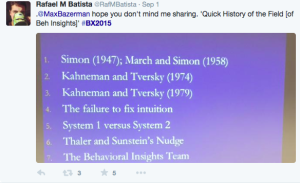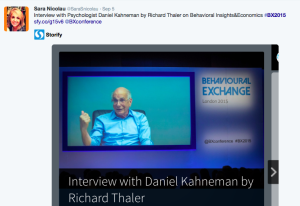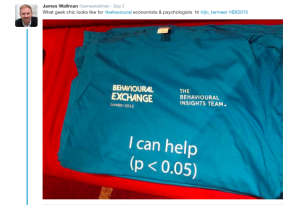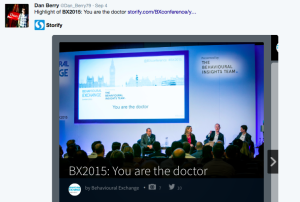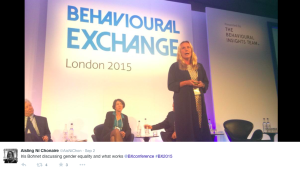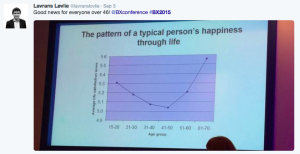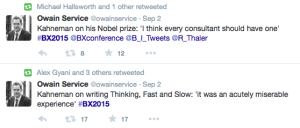Did you know?
The relentless stress caused by poverty has the same effect as reducing your IQ by about 15 points. And if you look even a little bit poor, you are also perceived as incompetent – so things are only looking worse for you tomorrow.
Most people lie and cheat a little; few lie and cheat a lot. Very few people actually steal…unless it’s for a good cause.
Want someone to do something for you? Do something – practically anything – for them first. No matter how small, if it is meaningful and personalized, people are wildly motivated by reciprocity. Toss in a little social pressure, a dash of authority, and top it off with a dazzlingly likeable smile, and…bam! – you’re a master influencer.
 When giving a talk on persuasive writing style, it helps to have some memorable style yourself, like pairing your classic podium-ready suit with unexpected cowboy boots and really fun hair (like Steven Pinker).
When giving a talk on persuasive writing style, it helps to have some memorable style yourself, like pairing your classic podium-ready suit with unexpected cowboy boots and really fun hair (like Steven Pinker).
The BX2015 conference was truly awesome. An international gathering of policy makers and practitioners from across the globe (the overwhelming majority from outside both the US and UK), and a highly curated group of expert speakers primarily in the behavioral economics and applied social sciences, convened in London to discuss how “nudges” can influence decisions and ultimately, change society and individual well-being for the better. Many lessons came from those who started this movement – literally, Inside the Nudge Unit.
I’m so inspired, and will be spending the coming weeks considering how to apply what I’ve learned to medical decision making. For now, here are some conference highlights:
In the 7 days surrounding the conference, #BX2015 reached over 7 million social media impressions on Twitter alone!
 Although he didn’t send any tweets himself, Dan Ariely claimed the top spot for most mentions. (A testament to his storytelling skills, not only did he garner such tremendous buzz, but he also used not a single slide during his presentation about dishonesty.) Others in the top ten included the very famous Richard Thaler, Steven Pinker, and Hal Varian – google’s chief economic officer.
Although he didn’t send any tweets himself, Dan Ariely claimed the top spot for most mentions. (A testament to his storytelling skills, not only did he garner such tremendous buzz, but he also used not a single slide during his presentation about dishonesty.) Others in the top ten included the very famous Richard Thaler, Steven Pinker, and Hal Varian – google’s chief economic officer.
The full #BX2015 transcript can be viewed on symplur.com. Here are a few of my favorite tweets:
This one I love because of my “Do or Don’t?” post about tweeting a speaker’s slide image. Note that while no permission is explicitly sought, the tweeter does acknowledge Max Bazerman as the slide author.
Because Richard Thaler and Daniel Kahneman are basically the rock stars of this discipline, and it was fun to see them engaged in a natural conversation, with a sneak peak into their relationship and personalities (spoiler – they are cute!)
Because I’m a nerd, too:
Because although having a medical degree instead of a Ph.D. made me a bit of an outsider, our session was a success:
Because apparently, having diversity on the hiring team does not lead to diverse hiring practices. We are all subject the same biases, and our descriptions of today (e.g. nannys are female) actually reinforce our expectations, becoming prescriptions for the future.
Because if this slide is true, things are only looking up for me:
Because if you have a Nobel Prize, you can do anything you want, even if what you want to do actually makes you miserable:
And for the obvious reason that presenting from the same stage with these geniuses is among my career highlights to date:
It was a real treat to speak with so many great minds in person – Eldar Shafir, Iris Bohnet, Steven Pinker, Hal Varian, Max Bazeman, Robert Cialdini – all of whom were surprisingly warm and eager to engage. I am looking forward to applying their insights to the major medical challenges we are currently facing. Clearly, there is much to learn from successes in wellness related areas like nutrition, vaccination, clean water initiatives, and more. But let’s go a step further:
What lessons can we learn from work done already on poverty, gender equality, leadership, and other seemingly unrelated areas? Can Cialdini’s 6 ingredients for influence improve medical error and near-miss reporting? Can it finally crack the silence code, and get people to speak up for safety, even when they themselves have something to lose by doing so? What can Pinker teach us about disseminating patient safety and decision making ideas that may not sound like rocket science, but have yet to get the space they deserve in the formal medical literature?
Solving these challenges is critical, because although we are not all physicians or healthcare professionals, we are all (eventual) patients.
What is your favorite example of a lesson adapted from another domain and applied to medicine for improved safety and patient care?


